On October 2, 2017 my father passed away. He was in his own home in Long Island, in a bed provided by hospice, his fourth wife Sue, his youngest son Chris, my youngest sister Alison, and me surrounding him.
I had been there for eight days, leaving a school visit I had in Rye Neck, running home, throwing clothes into a suitcase and driving like a mad woman to catch a ferry from Bridgeport to Port Jeff, arriving at Greenport Hospital just as the sun was going down. The last three days of my father’s life, I did not leave his side, sleeping on the floor, waking every hour when he felt he had to urinate, then changing his clothing and sheets, and lying awake in the dark, listening to him talk loudly and clearly, emphatically gesticulating with his arms, in long, (delusional? But who am I to say?) articulate and elaborate soliloquies.
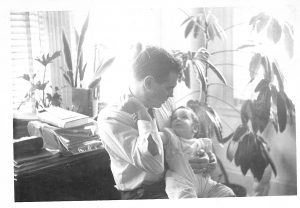
At some points in the late night hours, he spoke about his children. Once, he actually verbalized an apology to my sister Alison, for having been mean to her young son, something he never could have done in his more lucid moments, but only I was there to hear it.
Sometimes he gave full lectures on art history, on aestheticism, on Sartre. Sometimes he talked about the Korean War. But the second night, his last in this world, was worse. I will never know what horrors he was seeing or hearing, causing him to curl into a fetal position, to weep freely, to call out for his mother (who he hated fiercely), to wail aloud, that he was dying, as if he were forcing himself to understand this inevitable, incomprehensible finality.
The only time I left his side was to go to the bathroom myself, or to call the nurses for directions on how to administer the morphine and Lorazepam they had left us. And how carefully I measured and remeasured the syringes, and dutifully recorded the time and dosage, all the while my brain whirling and fizzing, and struggling to stay focused, exhausted and trying to ignore the inevitable incomprehensible finality. By morning he was finally calm.
It took many more daylight hours— rapid, labored breathing, twisted expressions of pain, or grief, or regret, or anger that moved across his face, but when finally, the entirely of his life left his body there was no doubt as to what had happened. My sister and I both looked over to the clock radio that sat on his night stand, and noted the time – 3:04 pm— with the same thought: 304 Springtown Road, New Paltz New York had been our childhood home, hers more than mine, but the home I still dream about when I dream of home.
So here’s the thing.
In pretty much all the ways you might measure a father, my dad scored poorly. He did not protect me from physical harm. He did not give me sense that was I worthy of being loved, or that I was special or pretty or valuable. For years in my early life he did not provide security or safety, but I have already written a lot about that, so I don’t want to do that here.
Instead I want to write about what my father did give me.
My father gave me Art.
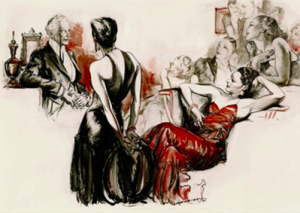
My father’s father was a well-known and highly successful illustrator, also named Henry P. Raleigh. He was also bi-polar and an alcoholic. My dad’s memories of him are not good. They are violent and cruel and sad. But the story goes (as told to me by my dad) that his father, despite his great monetary success, had never been happy as a man, nor as an artist. He had always felt labeled as a commercial artist and longed to be known as a fine artist. (Ironically, now, almost a century later that is exactly how he is known.) And my grandfather, penniless after photography replaced illustration, and after having lost all of his wealth, committed suicide by throwing himself out a window of a hotel room in Times Square in 1944 when my father was thirteen years old.
My father gave me Art.
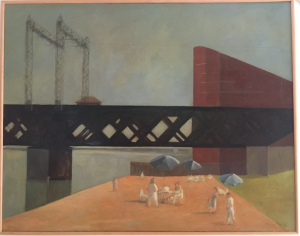
He gave me the belief that art, that one’s own art, is the only thing in this world that no one can take away from you.
He told me that art was the only thing that gave meaning to life (on this point I had grown to disagree with him. I find meaning in love and humanity but that’s another story).
He taught me that society needs art, not to teach lessons or promote agendas, but to reflect the particular moment in history in which it is created, to act as a witness.
Art is personal. You do it for yourself and if it touches other people that is its completion, but not its intention.
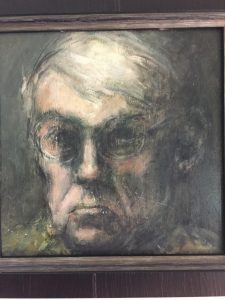
Art is never to have a purpose, he said. If it serves a function, like craft, like a beautiful ceramic bowl, that is something different. Not better or worse, just different.
When my dad died, my four siblings— three of us with three different mothers, all experiencing our own grief, were somehow unable to come together — and so despite my father’s many academic achievements and publications, despite the hundreds and hundreds of young art students whose work he had supported, despite his years at Pratt Institute, and then S.U.N. Y New Paltz, and his wartime service to his country, despite the fact that he had become what his own father had never been able to achieve — a fine artist, a painter, a university professor — my father had no funeral, no memorial, no obituary.
I had been typing up, and scanning the illustrations for my father’s essays on film and art criticism for about a decade, ever since the publication he wrote for required electronic submissions. When my dad’s typewriter broke and he couldn’t get it fixed, I had to type the essays from his increasingly illegible handwriting. In the last few months he was still writing, his aging, failing cognitive abilities became more and more apparent, but his baseline intelligence was so very high, it hardly mattered.
In return, whenever I published, or wrote some essay or article, especially if it was about art or creative freedom, or art criticism, I would send it to my dad. After he read it, we would jump on the phone and talk.
Art, he told me, is as important to a society as journalism is to democracy.
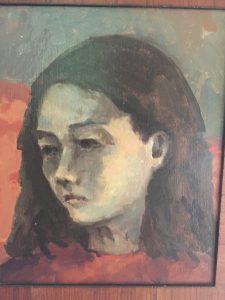
Art is what elevates us as human beings, above the fray of everything else. It is not essential to life, and that is exactly what makes it art
The very last piece of writing I shared with my dad was about artistic freedom. Over the past year, writing students and colleagues, published and unpublished, black, white, Asian, Jewish, Christian, Muslim and all else in between, had been expressing something to me about fear. Fear of social media and the ways in which literary “criticism” was being doled out and disseminated.** I felt it. And I cared deeply about it. I cared about other people, that they shouldn’t lose out on what had saved my life in the darkest of times, the freedom to write*.
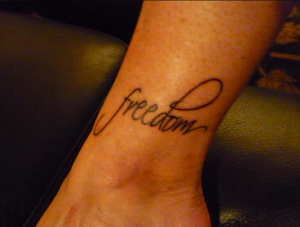
I sent it to him and we talked on the phone.
“It’s what you’ve always taught me, Dad. The most important thing for an artist to have is freedom. After their basic needs are met, food and shelter…comes freedom.”
I knew right away that something was wrong. His brain was wrong. He was having trouble more trouble breathing than usual. His thoughts were disjointed. He couldn’t quite follow the conversation, but he was trying so hard, and that made him frustrated, and angry. I got off the phone pretty quickly and I cried. It was hard to hear my dad unable to pontificate on a subject to which he had devoted his entire life.
I turned that piece of writing into a talk. Then I spent months working it. But I didn’t do it alone. I got feedback and pushback. I had discussions, sometimes heated, so I could learn and understand and try to close up any hole, any thing that could possibly be misconstrued or misunderstood. I gave my talk to people I knew would agree with me, and people who I knew wouldn’t. I gave it to friends of mine to read, friends who themselves had been savagely bullied and “attacked” on the internet with threats to their life and their safety, for something they wrote. I wrote this talk for them (if you doubt me, I have the screenshots).
Six months after my father’s death, I walked across the TEDx stage,*** onto the red circle, and I spoke for my dad, and for anyone anywhere who wants to be an artist.
*I am not speaking here about writers who are interested in publishing for the sake of publishing and looking for “issue books” to capitalize on.
** the initial impetus for this talk came after two of my friends (both women of color, since this seems to need to be clarified) were personally, cruelly, and violently abused on social media because of something they wrote. This is not a statement for or agains the texts in question, but simply a fact about social media “call out” and its effects on real live human beings.
*** a fully transcript and link to the talk is available on my previous blog post

Elinor Lipman
May 27, 2018 - 2:56 pm ·A wonderful essay. As ever, beautifully written, observed, felt.
Pam Warren
May 27, 2018 - 3:17 pm ·Your father gave you art. Your art gives insight and connection. Beautiful post that mirrored many emotions for me. Thank you.
Gordon Latter
May 30, 2018 - 1:17 pm ·Beautifully written, as expected. I owe my mother the same debt you owe your father. Reading your piece made me think more about it. Well done!
Cynthia Rider
May 30, 2018 - 11:42 pm ·Nicely written from the heart.
Your father gave you art. I recall your father giving us paint and brushes and allowing us to express ourselves in the basement of your home on Springtown road. It is nice that your father gave you the ability to express yourself and you found the perfect way to express yourself, with words.
We each are given something from each person we meet. Now you have the ability to give to so many. Each learning something different about themselves. I hope they acquire empathy and a freedom to do what they love with passion.
Thank you Nora. I too have learned from you.
Dorothea Osborn
December 13, 2018 - 2:02 am ·Nora,
I had your Dad as a Prif in New Paltz during one of the last semesters he taught. A colleague of his told me he had passed and it came as a surprise. He was instrumental in my progress, as I studied with him for years by traveling from Albany to NP, for one on one class. I can tell you more if you’d like. Send me a p.m. Blessings!
Mark Albright
March 3, 2021 - 2:03 am ·I was one of your dad’s students. I still paint I laughed when you mentioned craft. He mentioned that a lot in class; always in competition with the metalsmiths across the way in the smiley art building. I always say I had two father figures My father and yours. Both Korean war veterans my father a conscientious objector your father a machine gunist existentialist. I guess I got the best of both worlds. Your dad messed with my head but I’m still painting I still have the freedom. And I will always remember him.